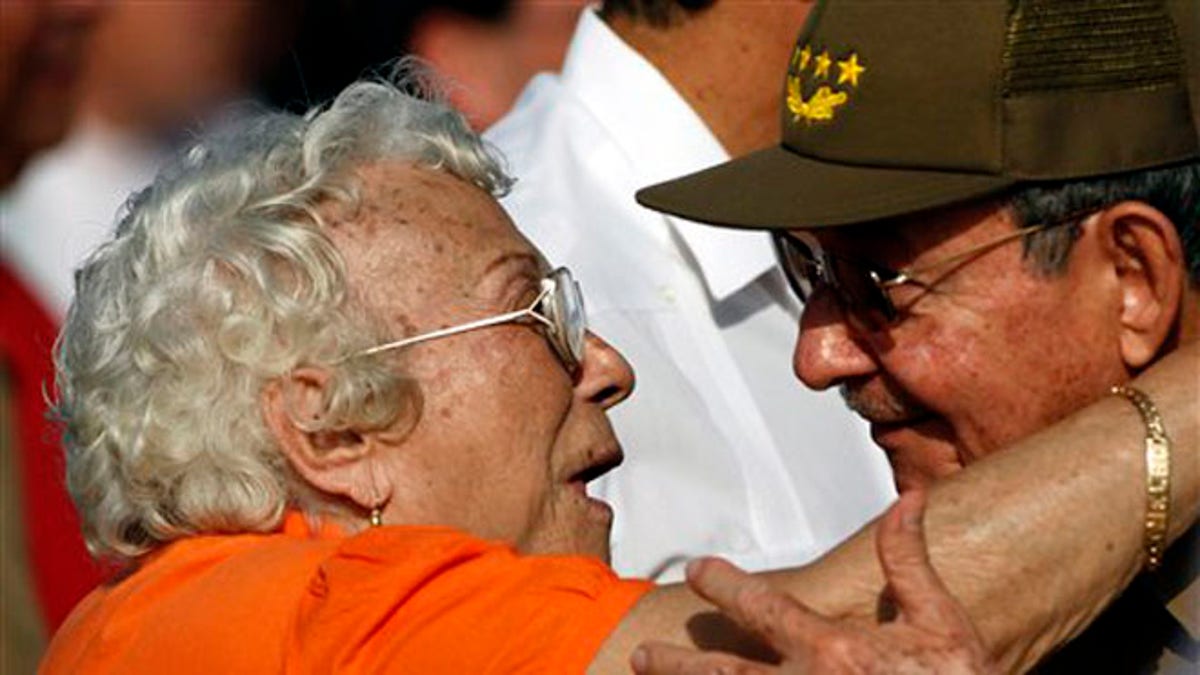
In this July 26, 2010 file photo, Melba Hernandez, left, greets Cuba's President Raul Castro at a Revolution Day rally in Santa Clara, Cuba. Hernandez, who died on Sunday, March 9, 2014, helped found the Communist Party of Cuba and served as ambassador in Vietnam and Cambodia. She was 92. (AP)
HAVANA (AP) – Melba Hernandez, one of two women who helped Fidel Castro launch his revolutionary battle with a failed 1953 attack on a military barracks, and who was later named a "heroine of the Cuban Revolution" has died at age 92.
A message from the Communist Party's Central Committee published Monday in the party newspaper Granma said Hernandez died the previous night of complications from diabetes.
"She is one of the most glorious and beloved combatants of the revolutionary quest, (and an) imperishable example of the Cuban woman," it read.
With her crown of snowy white curls, Hernandez was occasionally seen at official events in her later years, accompanied by one or the other of the Castro brothers. Fidel stepped down due to ill health in 2006, passing command to his younger brother Raul.
Born on July 28, 1921, Hernandez was five years older than Fidel Castro and remained faithful to him throughout her life.
- One Year After His Death, Hugo Chávez’s Revolution Showing Signs Of Strain
- Mexican Cartel Leader Nazario Moreno Gonzalez Long Declared Dead Was Actually Killed This Time
- Anti-Maduro Protests In Venezuela
- An American In Cuba
- Beyonce and Jay-Z Visit Cuba Evoking Bonnie & Clyde
- How to Travel to Cuba
- Cuba’s Revolution Turns 59
At the time of the July 26, 1953, assault on the Moncada Barracks in the eastern city of Santiago, Hernandez — like Castro — was a young attorney who had grown increasingly fed up with government corruption under Fulgencio Batista, who seized power in a 1952 coup.
She signed on to Castro's assault plans and obtained 100 uniforms for the attackers from an army sergeant who later joined the movement.
She and the only other woman involved in the operation, Haydee Santamaria, sewed insignia showing military ranks onto the uniforms. At a farm in the hours before the operation, the women ironed the uniform slacks and shirts.
The assault failed miserably, with many of the attackers killed by government soldiers and the rest, including Castro, arrested. The women, who were waiting nearby to provide medical assistance to their comrades, were also jailed. Santamaria's brother Abel was tortured and killed in prison.
Hernandez and Santamaria were freed months before the men and organized support rallies for those still jailed. They also distributed writings by Castro that were smuggled from behind bars — essays that helped rally sympathy for the revolutionaries.
Castro corresponded frequently with Hernandez when he was in prison, giving instructions on helping run his July 26 Movement. After the remaining rebels were freed, Hernandez traveled to Mexico with the group, including her new husband and fellow revolutionary Jesus Montane, to help organize a guerrilla army.
She did not, however, join the band that sailed from Mexico to launch an uprising in Cuba's eastern Sierra Maestra.
A member of the rebels' national directorate, Hernandez became a member of the guerrilla army's Third Front. Batista fled the country Jan. 1, 1959, and Castro took power soon after.
Hernandez later helped found the Communist Party of Cuba and served as ambassador to Vietnam and Cambodia.
She also was secretary-general of the Organization for the Solidarity of the Peoples of Asia, Africa and Latin America, a group founded in Cuba in 1966 to support independence struggles in developing nations.
In 1997, Hernandez was among five women from around the world who received human rights awards from Col. Moammar Gadhafi of Libya, long an ally of Cuba.
The University of Havana granted Hernandez an honorary doctorate in international relations in July 2007. "Melba has been one of the greatest exponents of Cuban diplomacy," National Assembly President Ricardo Alarcon said at the ceremony.
The announcement in Granma said Hernandez was to be cremated and her ashes interred in a cemetery alongside the remains of other participants in the Moncada attack.
Montane died in 1999 and Santamaria in 1980.
Follow us on twitter.com/foxnewslatino
Like us at facebook.com/foxnewslatino
